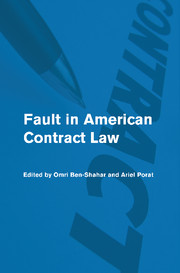Book contents
- Frontmatter
- Contents
- List of Contributors
- Preface
- Acknowledgment
- I THE CASE FOR STRICT LIABILITY
- II THE CASE FOR FAULT
- III BETWEEN STRICT LIABILITY AND FAULT
- IV WILLFUL BREACH
- 10 When Is a Willful Breach “Willful?” The Link Between Definitions and Damages
- 11 Willful Breach: An Efficient Screen for Efficient Breach
- 12 An Information Theory of Willful Breach
- 13 Contract Law and the Willfulness Diversion
- V COMPARATIVE FAULT
- VI THE MORALITY OF BREACH
- Case Index
- Subject Index
- References
11 - Willful Breach: An Efficient Screen for Efficient Breach
Published online by Cambridge University Press: 10 November 2010
- Frontmatter
- Contents
- List of Contributors
- Preface
- Acknowledgment
- I THE CASE FOR STRICT LIABILITY
- II THE CASE FOR FAULT
- III BETWEEN STRICT LIABILITY AND FAULT
- IV WILLFUL BREACH
- 10 When Is a Willful Breach “Willful?” The Link Between Definitions and Damages
- 11 Willful Breach: An Efficient Screen for Efficient Breach
- 12 An Information Theory of Willful Breach
- 13 Contract Law and the Willfulness Diversion
- V COMPARATIVE FAULT
- VI THE MORALITY OF BREACH
- Case Index
- Subject Index
- References
Summary
Willful breach doctrine should be a major embarrassment to contract law. If the default remedy for breach is expectation damages designed to put the injured promisee in the position in which she would have been had the contract been performed, then the promisor's behavior – the reason for the breach – looks to be irrelevant in assessing damages. And yet the cases are full of references to “willful” breaches, which seem often to be treated more harshly than ordinary ones based on the promisor's bad/willful conduct. This chapter's explanation is that willful breaches are best understood as those that should be prevented or deterred because the parties have implicitly agreed that the promisor would not breach in those circumstances. When willfulness, so understood, is present, courts rightly award remedies that serve to deprive the promisor of any incentive to breach and to assure the promisee of getting her full expectation.
Willful breach is an embarrassment to contract law. The standard remedy for breach of contract is expectation damages, which are designed to put the injured promisee in the position in which she would have been had the contract been performed. Yet courts often award greater remedies when they find “willful breach,” even though the willfulness of a breach can have little to do with the promisee's expectation interest, which is measured with reference to the harm suffered by the injured promisee, and that is the same whatever motivated the promisor's breach.
- Type
- Chapter
- Information
- Fault in American Contract Law , pp. 161 - 173Publisher: Cambridge University PressPrint publication year: 2010



